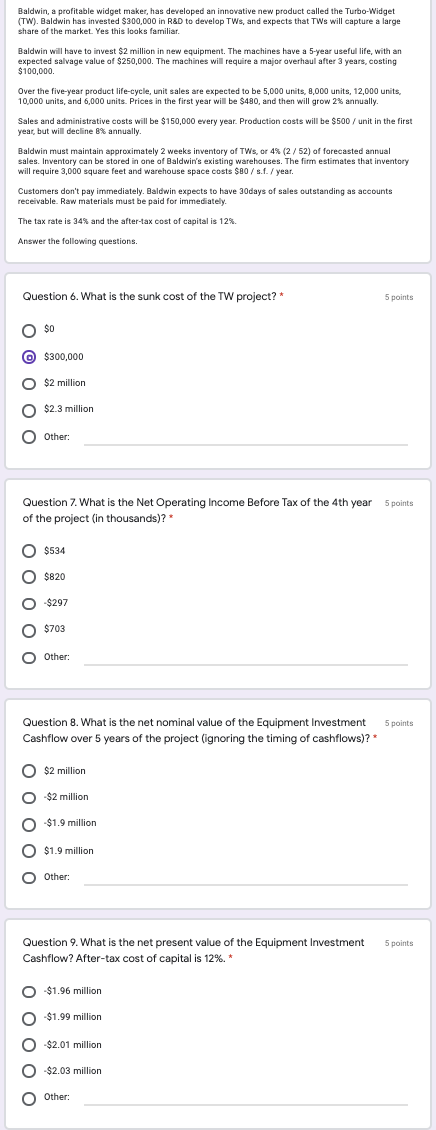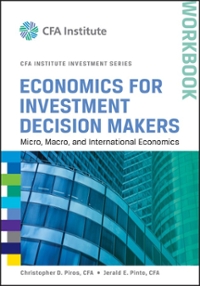
Baldwin, a profitable widget maker, has developed an innovative new product called the Turbo-Widget (TW). Baldwin has invested $200,000 in R&D to develop TWs, and expects that we will capture a large share of the market. Yes this looks familiar. Baldwin will have to invest $2 million in new equipment. The machines have a 5-year useful life with an expected salvage value of $250,000. The machines will require a major overhaul after 3 years, costing $100,000 Over the five-year product life-cycle, unit sales are expected to be 5,000 units, 8,000 units, 12,000 units, 10,000 units, and 6,000 units. Prices in the first year will be $480, and then will grow 2% annually. Sales and administrative costs will be $150,000 every year. Production costs will be $500/unit in the first year, but will decline 8% annually. Baldwin must maintain approximately 2 weeks inventory of TWs, or 4% (2/52) of forecasted annual sales. Inventory can be stored in one of Baldwin's existing warehouses. The firm estimates that inventory will require 3,000 square feet and warehouse space costs $80 / s.f./ year. Customers don't pay immediately. Baldwin expects to have 30days of sales outstanding as accounts receivable. Raw materials must be paid for immediately The tax rate is 34% and the after-tax cost of capital is 12% Answer the following questions. Question 6. What is the sunk cost of the TW project?* 5 points O $0 O $300,000 $2 million $2.3 million Other: 5 points Question 7. What is the Net Operating Income Before Tax of the 4th year of the project (in thousands)? * O $820 -$297 O $703 O Other: 5 points Question 8. What is the net nominal value of the Equipment Investment Cashflow over 5 years of the project (ignoring the timing of cashflows)? O $2 million $ -$2 million $1.9 million $1.9 million O Other: 5 points Question 9. What is the net present value of the Equipment Investment Cashflow? After-tax cost of capital is 12%.* -$1.96 million -$1.99 million -$2.01 million $2.03 million Other: Baldwin, a profitable widget maker, has developed an innovative new product called the Turbo-Widget (TW). Baldwin has invested $200,000 in R&D to develop TWs, and expects that we will capture a large share of the market. Yes this looks familiar. Baldwin will have to invest $2 million in new equipment. The machines have a 5-year useful life with an expected salvage value of $250,000. The machines will require a major overhaul after 3 years, costing $100,000 Over the five-year product life-cycle, unit sales are expected to be 5,000 units, 8,000 units, 12,000 units, 10,000 units, and 6,000 units. Prices in the first year will be $480, and then will grow 2% annually. Sales and administrative costs will be $150,000 every year. Production costs will be $500/unit in the first year, but will decline 8% annually. Baldwin must maintain approximately 2 weeks inventory of TWs, or 4% (2/52) of forecasted annual sales. Inventory can be stored in one of Baldwin's existing warehouses. The firm estimates that inventory will require 3,000 square feet and warehouse space costs $80 / s.f./ year. Customers don't pay immediately. Baldwin expects to have 30days of sales outstanding as accounts receivable. Raw materials must be paid for immediately The tax rate is 34% and the after-tax cost of capital is 12% Answer the following questions. Question 6. What is the sunk cost of the TW project?* 5 points O $0 O $300,000 $2 million $2.3 million Other: 5 points Question 7. What is the Net Operating Income Before Tax of the 4th year of the project (in thousands)? * O $820 -$297 O $703 O Other: 5 points Question 8. What is the net nominal value of the Equipment Investment Cashflow over 5 years of the project (ignoring the timing of cashflows)? O $2 million $ -$2 million $1.9 million $1.9 million O Other: 5 points Question 9. What is the net present value of the Equipment Investment Cashflow? After-tax cost of capital is 12%.* -$1.96 million -$1.99 million -$2.01 million $2.03 million Other







